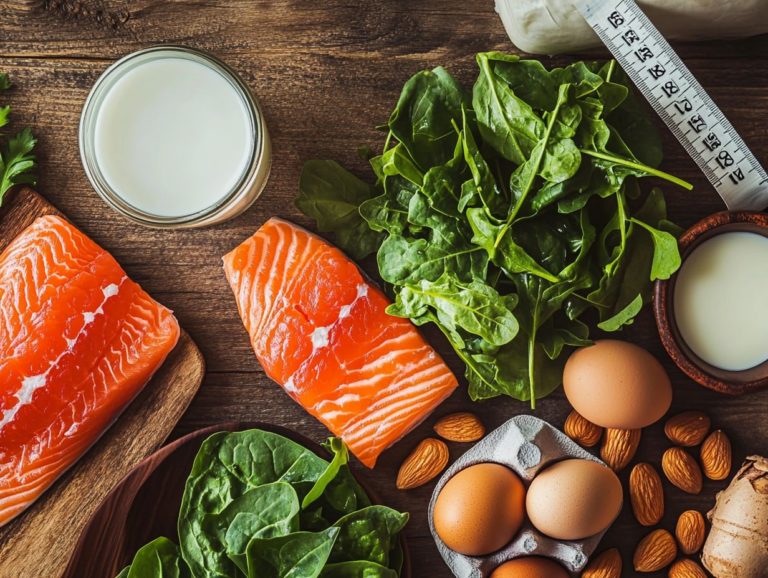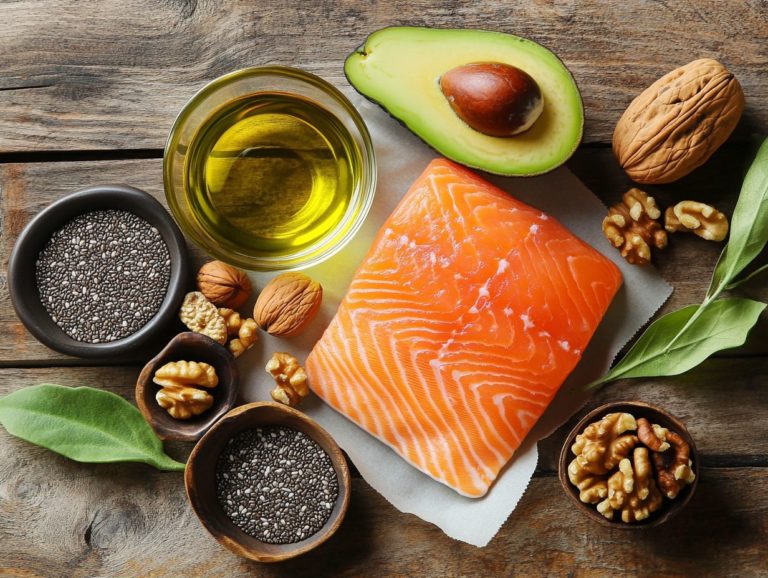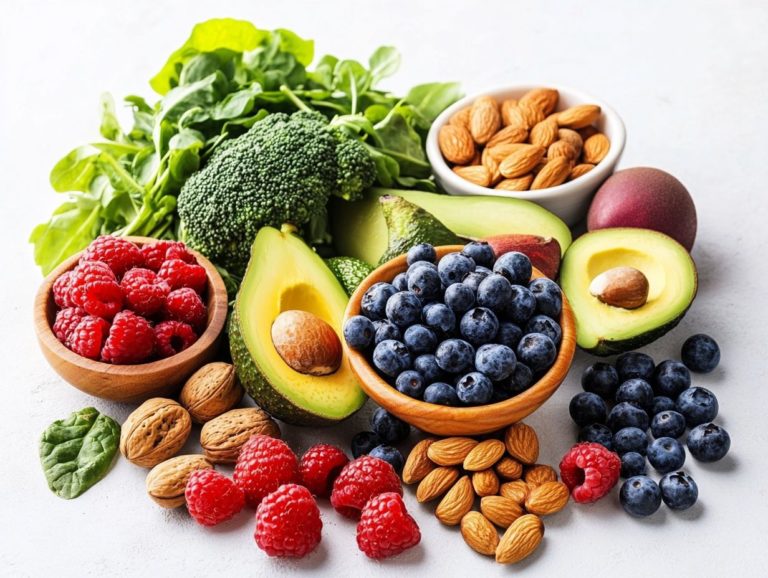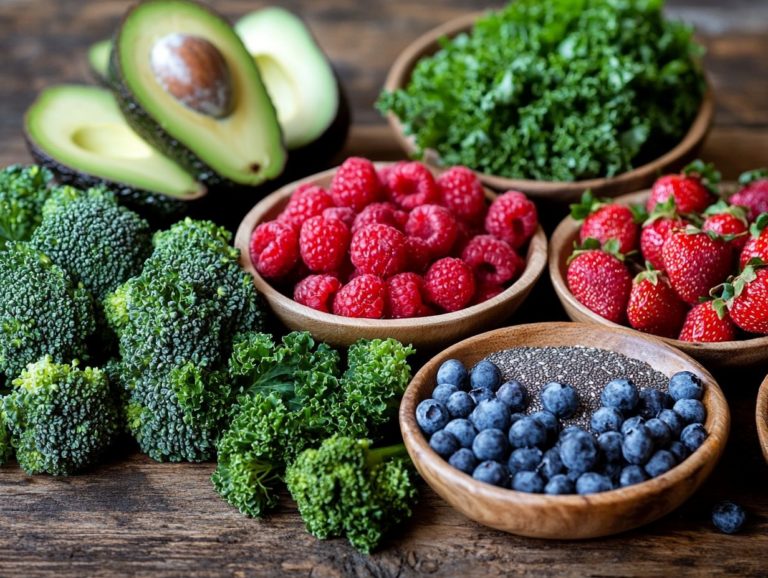Top Seafood Sources for Omega-3s
Omega-3 fatty acids are vital for sustaining optimal health, and seafood stands out as one of the finest sources to obtain your daily dose.
From rich, fatty fish to delectable shellfish, the ocean presents a diverse array of options brimming with these beneficial nutrients.
This article delves into the premier seafood sources for omega-3s, outlining their nutritional profiles, health benefits, and any potential risks. You will also find practical tips on how to seamlessly incorporate these delightful foods into your diet. Jump in now to discover how seafood can transform your health!
Contents
- Key Takeaways:
- 1. Fatty Fish
- 2. Shellfish
- 3. Salmon
- Discover the Power of Mackerel for Your Health!
- Unlock the Benefits of Sardines!
- Enjoy the Versatility of Tuna!
- Discover the Hidden Gem: Herring!
- Experience the Flavor of Anchovies!
- 9. Cod Liver Oil
- 10. Trout
- 11. Oysters
- 12. Shrimp
- 13. Crab
- 14. Scallops
- 15. Lobster
- How Much Omega-3s Do These Seafood Sources Provide?
- Frequently Asked Questions
- What are the top seafood sources for omega-3s?
- How much omega-3s can be found in these seafood sources?
- Are these seafood sources safe to consume?
- Can people with seafood allergies still get omega-3s from other sources?
- How often should these seafood sources be consumed for optimal omega-3 intake?
- Are there any other benefits to consuming these top seafood sources for omega-3s?
Key Takeaways:
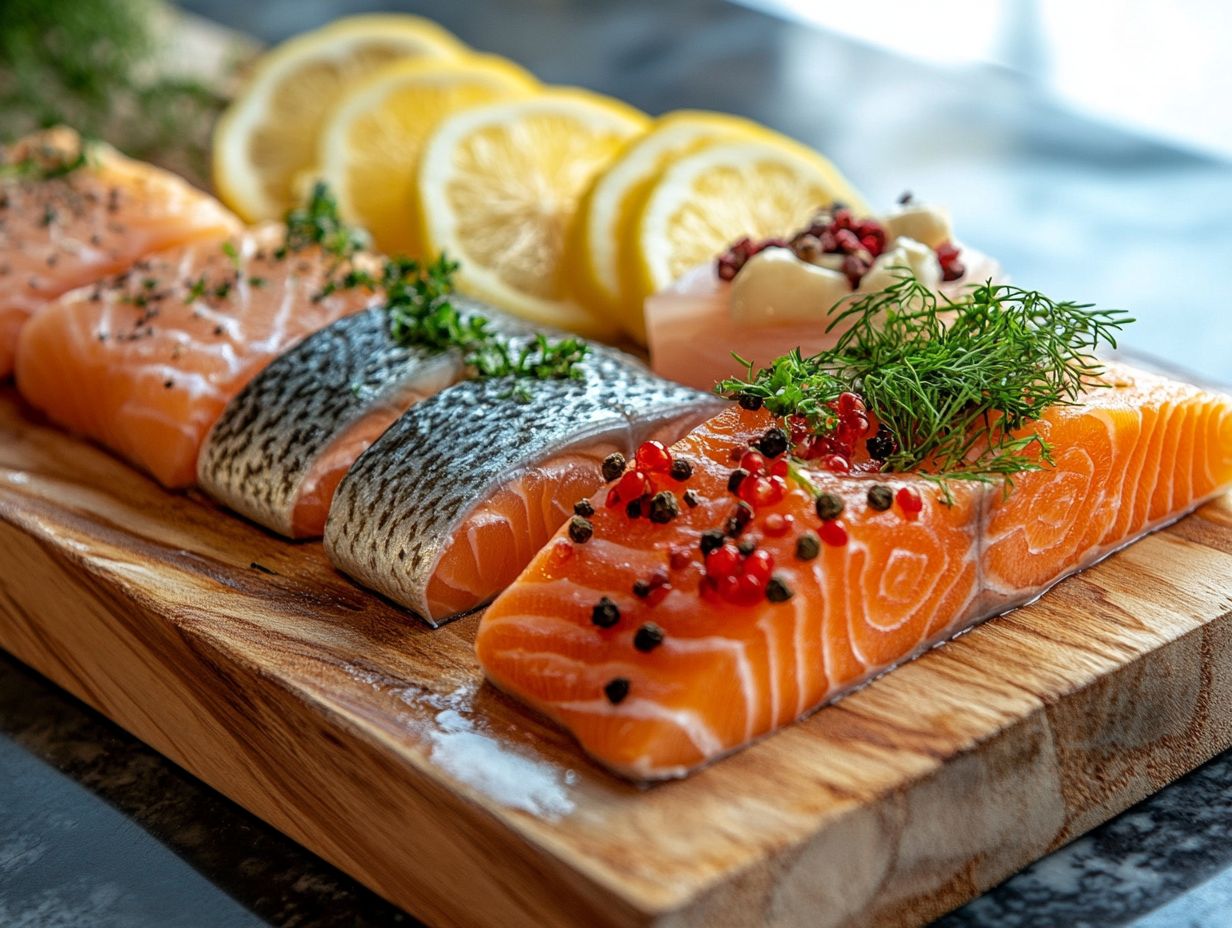
Fatty fish like salmon, mackerel, and tuna provide high levels of EPA and DHA. These are essential for brain and heart health.
Shellfish like oysters, shrimp, and scallops are low in calories and fat. They’re a healthy choice for anyone watching their weight.
Cod liver oil is another concentrated source of omega-3s, plus it has vitamins A and D for bone and eye health.
Incorporating seafood into your meals can boost your health with a variety of dishes and cooking methods.
1. Fatty Fish
Fatty fish, like salmon, mackerel, and sardines, are celebrated for their impressive omega-3 fatty acid content. They are essential for both brain and heart health. These nutrient-rich foods help reduce inflammation and bolster cardiovascular health.
By incorporating fatty fish into your meals, you elevate the flavor profile while reaping substantial nutritional rewards. This ensures a well-rounded intake of protein sources that support your overall well-being.
Take salmon, for example. It’s brimming with EPA and DHA, types of omega-3 fatty acids that support heart and brain health. Mackerel not only has great taste but is also particularly rich in vitamin D, which facilitates calcium absorption and promotes strong bones.
Sardines are often hailed for their sustainability; they re loaded with omega-3s and offer a variety of vitamins and minerals, making them a flexible option for nutrient enhancement.
By regularly savoring these fatty fish, you can help ward off chronic diseases, boost cognitive function, and nurture emotional well-being making them a savvy addition to any diet.
2. Shellfish
Shellfish, including oysters, shrimp, and mussels, are fantastic sources of omega-3-rich foods. They can significantly enhance your dietary intake of essential fatty acids.
Not only do these delectable morsels provide essential fats, but they also deliver crucial vitamins and minerals, such as vitamin B12 and zinc, vital for maintaining a robust immune system.
Varieties like shrimp, clams, and scallops are brimming with lean protein, making them perfect for your health-focused meal plan.
Steaming, grilling, or baking shellfish preserves their delicate flavors while keeping added fats to a minimum. Dishes like shrimp scampi or clam chowder can elevate any dining experience, transforming healthy eating into something exciting and utterly delicious.
3. Salmon
Salmon stands out as one of the most nutritious fatty fish, celebrated for its rich content of omega-3 fatty acids, which significantly benefit your heart health. This makes it a staple in dietary recommendations from esteemed health organizations like the American Heart Association.
These essential fats not only bolster cardiovascular wellness but also play a vital role in supporting brain function and reducing inflammation throughout your body.
When considering types of salmon, you’ll find that wild-caught versus farmed varieties can influence both the omega-3 content and flavor profile. Regularly enjoying this delectable fish offers numerous health benefits, including improved mood and a reduced risk of chronic diseases.
If you re looking to incorporate salmon into your meals, consider easy recipes like:
- baked salmon with lemon and dill
- a refreshing salmon salad
These dishes effortlessly blend flavor and nutrition, making it simple for you to savor this powerhouse of omega-3s.
Discover the Power of Mackerel for Your Health!
Mackerel is a fatty fish that brings a wealth of benefits thanks to its impressive healthy fats, which are good for your heart and brain. This makes it a standout choice for anyone looking to cultivate a healthy diet focused on preventing chronic diseases and enhancing overall well-being.
With its rich supply of protein, vitamins B12 and D, and essential minerals like selenium and phosphorus, mackerel delivers a comprehensive nutritional profile that supports everything from cognitive function to bone health. The omega-3 fatty acids in this fish, especially EPA and DHA, are celebrated for their anti-inflammatory properties and heart-healthy benefits, helping to lower blood pressure and reduce the risk of heart problems.
When preparing mackerel, consider grilling, baking, or smoking it to elevate its rich, buttery flavor. Here are some delicious meal ideas!
- A vibrant mackerel salad tossed with mixed greens and roasted vegetables.
- Indulge in a savory mackerel p t spread on whole-grain toast for a delicious and nutritious enhancement to any meal.
Unlock the Benefits of Sardines!
Sardines often fly under the radar, but they are a treasure trove of healthy fats that are good for your heart. Packed with health benefits, these nutrient-dense seafood options can elevate your diet.
These small fish are loaded with essential fatty acids that promote heart health, reduce inflammation, and support optimal brain function. With impressive levels of vitamin D and calcium, sardines are an excellent choice for strengthening your bones.
When preparing sardines, the possibilities are endless! Whether you grill them with a squeeze of lemon, toss them into a zesty pasta, or mix them into a refreshing salad, their versatility enhances flavor and boosts nutritional profiles. Healthy eating can be both effortless and delightful!
Enjoy the Versatility of Tuna!
Tuna stands out as a favorite among seafood enthusiasts. Celebrated for its culinary versatility and impressive healthy fats, it makes for a valuable protein option in a healthy diet.
You ll find several varieties of tuna, each presenting distinct flavors and textures:
- Bluefin tuna is highly sought after for its rich taste.
- Albacore boasts a mild flavor and firm texture.
Both types are packed with essential omega-3 fatty acids that support heart health and brain function. Imagine whipping up a fresh tuna salad with vibrant veggies or grilling marinated tuna steaks for an indulgent treat!
Be sure to choose sustainably sourced options and monitor mercury levels to maximize health benefits while minimizing risks. Don’t miss out on these health benefits!
Discover the Hidden Gem: Herring!
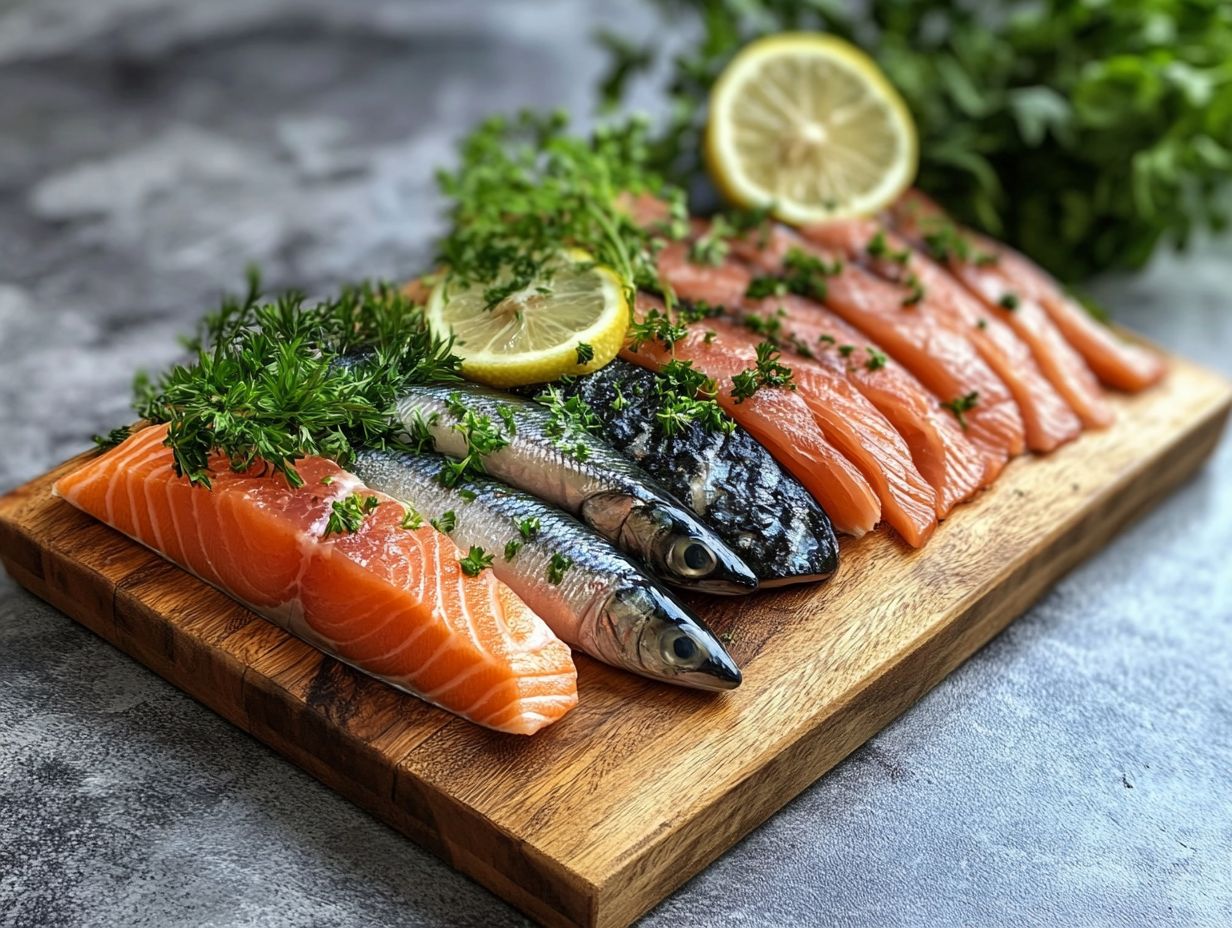
Herring may not be the most famous fish on the market, but it’s a hidden gem brimming with nutrition. Rich in healthy fats, it offers numerous health benefits and serves as a natural remedy for various age-related ailments.
This vibrant fish not only strengthens your heart by reducing inflammation and improving cholesterol levels, but it also supports brain health, potentially warding off cognitive decline. Packed with essential vitamins and minerals like vitamin D and selenium, herring is a powerhouse in any diet.
Herring is incredibly versatile! Whether you choose to enjoy it smoked, pickled, or grilled, each preparation method enhances its rich, savory flavor while preserving all those wonderful nutritional benefits.
Experience the Flavor of Anchovies!
Anchovies might be small, but they pack a mighty punch in the culinary world. Not only do they serve as a flavor enhancer in various dishes, but they re also an excellent source of healthy fats that align beautifully with healthy eating guidelines.
These tiny fish are brimming with nutrients, offering an impressive dose of protein, calcium, and essential vitamins all packed into a small package. Their distinctive, salty flavor can elevate countless recipes, whether blended into a rich pasta sauce, tossed into a fresh salad, or baked atop a delicious pizza.
By incorporating anchovies into your meals, you re not just adding a depth of umami; you’re also reaping the benefits of their heart-healthy omega-3 fatty acids. These little gems support cardiovascular health and help reduce inflammation, making them a wise choice for enhancing your nutrition without compromising on taste!
9. Cod Liver Oil
Cod liver oil stands out as a powerful source of omega-3 supplements, bolstering heart health and delivering essential vitamins like vitamin D that contribute to your overall well-being.
Beyond its cardiovascular benefits, this oil is packed with nutrients and possesses remarkable anti-inflammatory properties. It plays a vital role in joint health and enhances your mobility.
The addition of vitamins A and D further elevates its benefits. These vitamins help strengthen your immune system and support bone health.
For the best results, consider incorporating one to two teaspoons into your daily routine, tailored to your dietary needs and lifestyle. Regular use may enhance your mood and cognitive function, making it a valuable ally in your wellness journey.
10. Trout
Trout is a delightful and versatile fish that is rich in healthy fats good for your heart, making it the perfect choice for anyone looking to maintain a healthy diet without sacrificing flavor.
This freshwater marvel comes in several varieties, such as rainbow, brook, and brown trout, each offering its unique flavors and textures. Rich in omega-3s, trout supports heart health, reduces inflammation, and contributes to optimal brain function.
Incorporating trout into your weekly meal plans is a breeze; you can grill, bake, or pan-sear it, allowing for creative cooking methods that enhance its natural taste. For a quick weeknight dinner, consider a lemon-herb baked trout served alongside steamed vegetables or whip up a hearty trout salad with grains and mixed greens.
With its adaptability and numerous health benefits, including trout in your meals becomes both a delicious and nutritious endeavor.
11. Oysters
Oysters are not merely a sumptuous seafood choice; they also rank among the best sources of omega-3 fatty acids and are enriched with nutrients like zinc that significantly enhance their health benefits.
This nutrient-dense shellfish boasts an impressive collection of vitamins and minerals that bolster overall well-being, making it a wise addition to your diet. Enjoy them baked, grilled, or raw on the half shell with a refreshing squeeze of lemon and a dash of hot sauce for that extra zing.
The versatility of oysters opens the door to creative dishes such as:
- Oyster stew
- Fried oyster po’ boys
- Refreshing oyster ceviche
This delightful seafood caters to a variety of palates while allowing you to enjoy the myriad rewards of its omega-3 content and essential nutrients.
12. Shrimp
Shrimp is a beloved seafood that brings both flavor and nutrition to your table. It is celebrated for its versatility and impressive protein content. While it may not top the charts in omega-3 fatty acids, it still plays a valuable role in a well-rounded diet.
Its lean protein makes shrimp an exceptional option for anyone aiming to maintain or build muscle while keeping calorie intake in check. Packed with essential nutrients like vitamin B12, iodine, and selenium, shrimp supports a range of bodily functions that contribute to your overall health.
Cooking methods such as grilling, saut ing, or boiling can elevate its natural flavors while preserving its nutritional benefits. Dishes like shrimp scampi, shrimp stir-fry, or a classic shrimp cocktail not only highlight its culinary flexibility but also allow you to indulge in a delicious meal while enjoying the myriad benefits of this seafood delicacy.
13. Crab
Crab, with its delightful flavor and texture, is a fantastic source of omega-3-rich foods, making it a nutritious addition to any meal while providing essential protein.
Not only does this exquisite shellfish come in various types such as blue crab, king crab, and Dungeness crab each boasting distinct flavors and culinary possibilities, but it also delivers impressive health benefits.
Rich in omega-3 fatty acids, crabs support heart health, enhance brain function, and reduce inflammation, making them an excellent choice for anyone looking to elevate their diet.
Whether you’re whipping up crab cakes or indulging in a spicy crab dip, incorporating these seafood treasures into your meals can be both delicious and nutritious, catering to diverse palates and dietary needs.
14. Scallops
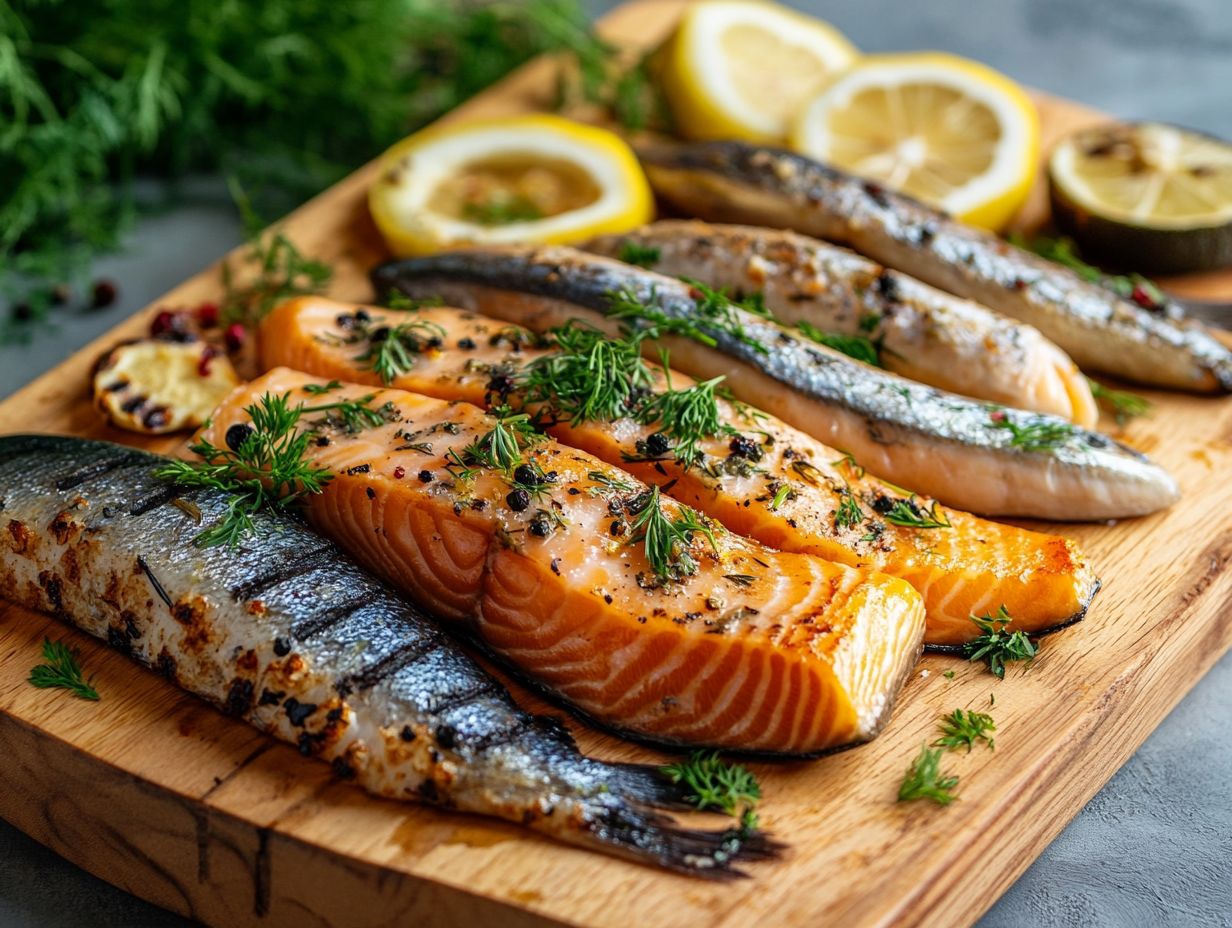
Scallops are a gourmet seafood delight that tantalize your taste buds and serve as a remarkable source of omega-3 fatty acids. This elevates their status as a healthy protein option.
These healthy fats support heart health, reduce inflammation, and boost brain function, making scallops a wise choice for anyone looking to enhance their diet.
Scallops are amazing in the kitchen and effortlessly complement a wide array of dishes. You can sear them to perfection, grill them gently, or toss them into a hearty pasta dish.
Their naturally sweet flavor pairs exquisitely with citrus and herbs, enhancing both taste and health benefits for a truly versatile culinary adventure.
15. Lobster
Lobster is a luxurious seafood choice that delights your palate and delivers a commendable dose of omega-3 fatty acids. This exquisite marine delicacy is rich in healthy fats that promote heart health, reduce inflammation, and bolster cognitive function.
Incorporating lobster into your meals can elevate any dining occasion, whether you re hosting a casual gathering or enjoying an elegant dinner. Enjoy this tasty ingredient by trying:
- Grilling the tails for a delightful smoky flavor
- Poaching it in butter for an indulgent touch
Lobster also shines in pasta dishes, bisques, or as a sublime topping on a fresh salad, transforming any meal into a culinary celebration.
How Much Omega-3s Do These Seafood Sources Provide?
Understanding the omega-3 content in different seafood sources is essential for making informed dietary choices that align with health benefits. These omega-3 fatty acids are vital for promoting your overall well-being.
Primarily found in fish and certain shellfish, omega-3s support cardiovascular health, enhance brain function, and reduce inflammation in your body.
To appreciate these nutrients, compare omega-3 content across various seafood options like salmon, mackerel, sardines, and tuna.
Daily intake recommendations can guide you in incorporating these nutrient-rich foods into your meals, ensuring a balanced diet that aligns with your health goals.
Practical preparation suggestions can help you maximize the absorption of these beneficial fatty acids, making every bite count.
What Are the Other Nutrients Found in These Seafood Sources?
Along with omega-3 fatty acids, various seafood sources are brimming with essential nutrients, including vital vitamins and minerals. Seafood not only champions heart health but also offers a treasure trove of vitamins like A, B12, and D, along with key minerals such as iodine, selenium, and zinc.
Take fatty fish like salmon and mackerel, for example they re rich in vitamin D, crucial for both bone health and immune function. Shellfish like oysters and clams also shine as exceptional sources of vitamin B12, which is essential for nerve function and energy production.
The selenium found in species like tuna contributes to antioxidant protection, promoting overall wellness and potentially lowering the risk of chronic diseases.
Embracing seafood in your diet is not just a feast for the senses; it s a pathway to enhanced health.
What Are the Health Benefits of Consuming Omega-3s from Seafood?
Consuming omega-3s from seafood can lead to a wealth of health benefits, including reduced inflammation and a diminished risk of chronic diseases. This makes seafood an essential component of a nutritious diet.
Research indicates that omega-3 fatty acids, especially EPA and DHA found in fish, significantly contribute to brain health by enhancing cognitive function and potentially lowering the risk of neurodegenerative diseases.
The American Heart Association advocates for incorporating omega-3-rich foods into your meals, highlighting their positive impact on cardiovascular health, such as lowering blood pressure and improving cholesterol levels.
Regular omega-3 intake may elevate mood and help alleviate symptoms of depression, supporting your overall well-being.
Eating seafood regularly can keep you healthy and happy!
Are There Any Risks Associated with Consuming Seafood for Omega-3s?
Seafood is an essential source of omega-3 fatty acids. However, it’s important to be aware of the potential risks tied to its consumption, particularly regarding mercury levels.
Mercury, a heavy metal lurking in larger fish like swordfish and shark, can lead to serious health issues, including nerve damage, especially for pregnant women and young children.
To choose safe seafood options, opt for lower-mercury choices such as:
- Salmon
- Sardines
- Shrimp
Limit your intake of high-mercury species. Check local advisories on fish caught in your area for better insight. This helps you enjoy seafood’s health benefits while minimizing mercury risks.
How Can One Incorporate These Seafood Sources into Their Diet?
Enjoying seafood is not only delicious but also incredibly good for you! Many health guidelines highlight the importance of omega-3-rich foods for your well-being.
To streamline this process, plan your meals around seafood options. Designate specific days to indulge in fish or shellfish. This alleviates the stress of last-minute choices.
Experiment with various cooking techniques grilling, baking, or steaming. These methods enhance flavors and safeguard essential nutrients.
Simple recipes, like zesty lemon-dill salmon or a quick shrimp stir-fry, can be prepared in no time. They provide nutritious and delicious meals without demanding too much of your schedule.
Pair seasonal vegetables with your seafood to amplify flavors and create a beautifully balanced plate.
Frequently Asked Questions
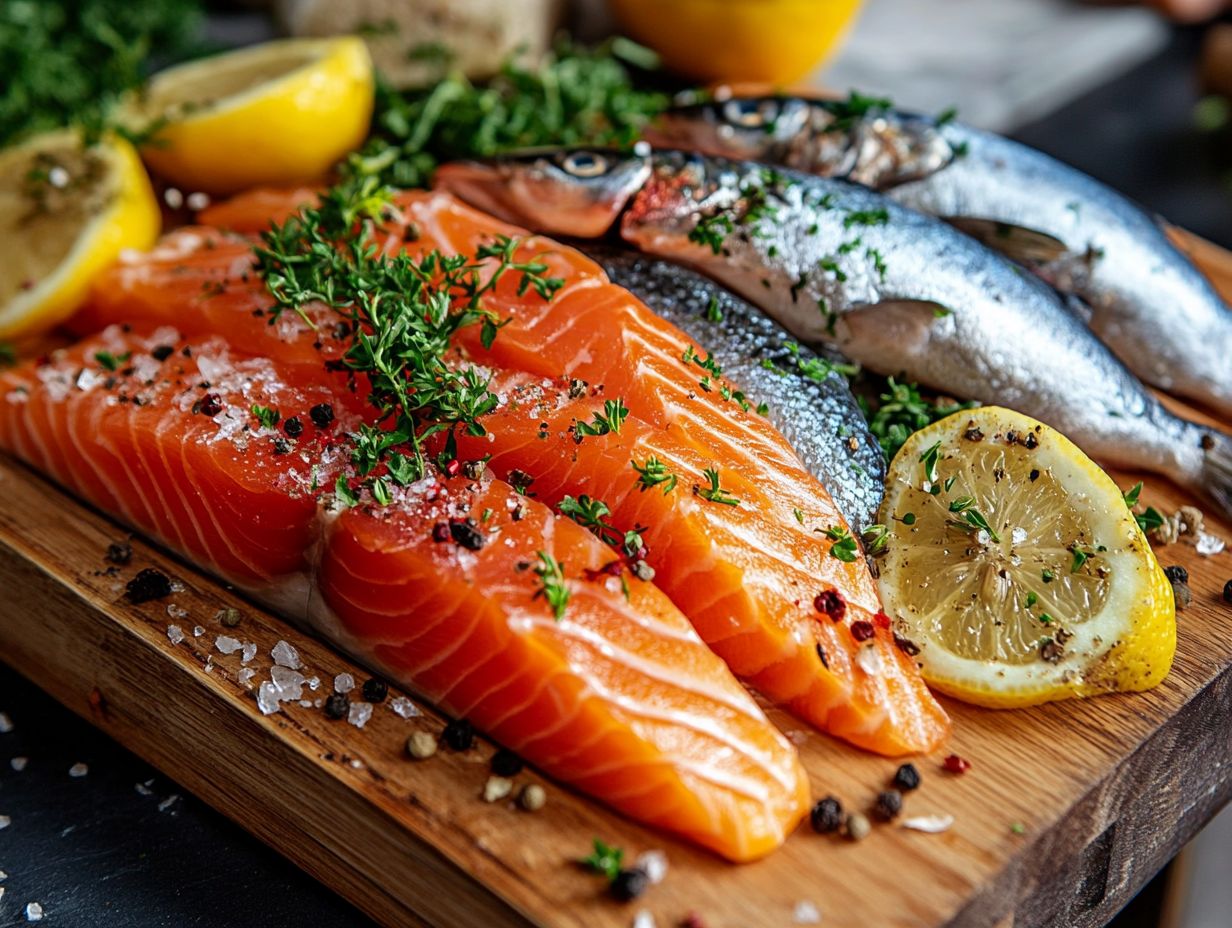
What are the top seafood sources for omega-3s?
The top seafood sources for omega-3s include salmon, mackerel, sardines, tuna, trout, and herring.
How much omega-3s can be found in these seafood sources?
The amount of omega-3s can vary depending on the type of fish. On average, a 3-ounce serving of these seafood sources contains between 1,000 to 1,500 milligrams of omega-3s.
Are these seafood sources safe to consume?
Yes, these seafood sources are generally considered safe to consume. However, it is important to purchase fish from reputable sources and follow proper cooking and storage techniques to reduce the risk of foodborne illnesses.
Can people with seafood allergies still get omega-3s from other sources?
Yes, people with seafood allergies can still get omega-3s from plant-based foods like flaxseed, chia seeds, and walnuts.
How often should these seafood sources be consumed for optimal omega-3 intake?
The American Heart Association recommends consuming at least two servings of seafood per week to meet the recommended intake of omega-3s.
Are there any other benefits to consuming these top seafood sources for omega-3s?
Yes, in addition to being a good source of omega-3s, these seafood sources also provide essential nutrients such as protein, vitamin D, and minerals like iron and zinc.

